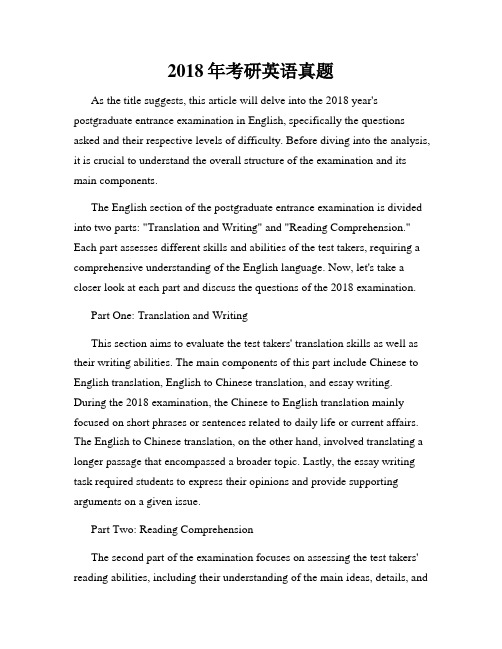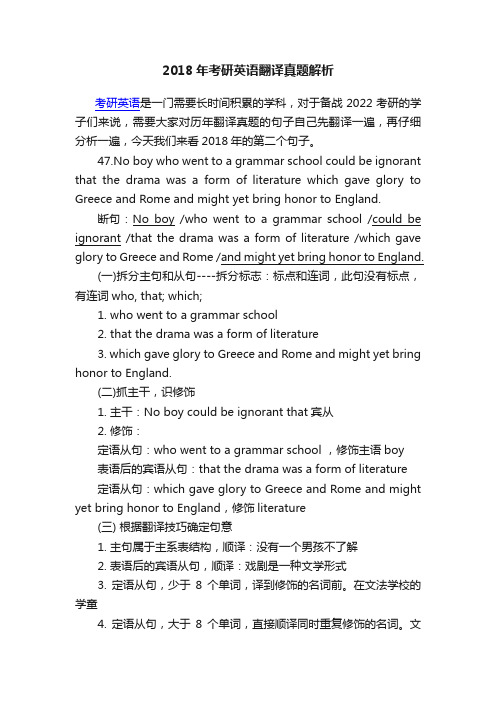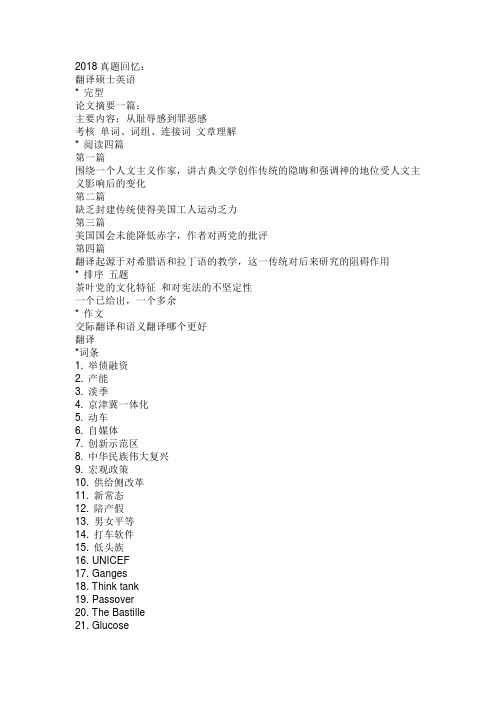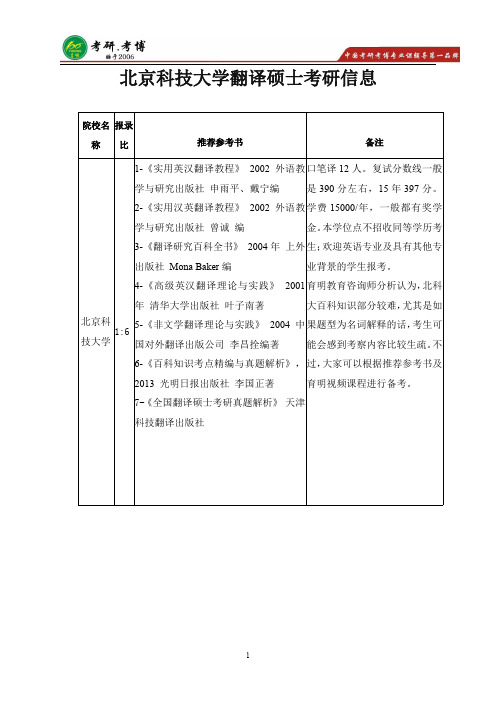2018年北京科技大学翻译硕士英语考研真题
2018年考研英语真题

2018年考研英语真题As the title suggests, this article will delve into the 2018 year's postgraduate entrance examination in English, specifically the questions asked and their respective levels of difficulty. Before diving into the analysis, it is crucial to understand the overall structure of the examination and its main components.The English section of the postgraduate entrance examination is divided into two parts: "Translation and Writing" and "Reading Comprehension." Each part assesses different skills and abilities of the test takers, requiring a comprehensive understanding of the English language. Now, let's take a closer look at each part and discuss the questions of the 2018 examination.Part One: Translation and WritingThis section aims to evaluate the test takers' translation skills as well as their writing abilities. The main components of this part include Chinese to English translation, English to Chinese translation, and essay writing. During the 2018 examination, the Chinese to English translation mainly focused on short phrases or sentences related to daily life or current affairs. The English to Chinese translation, on the other hand, involved translating a longer passage that encompassed a broader topic. Lastly, the essay writing task required students to express their opinions and provide supporting arguments on a given issue.Part Two: Reading ComprehensionThe second part of the examination focuses on assessing the test takers' reading abilities, including their understanding of the main ideas, details, andlogical structure of the given passages. In 2018, the reading comprehension section consisted of three passages, each followed by several multiple-choice questions. The passages covered a wide range of topics, from social issues to scientific research, challenging the students' comprehension skills across various subjects.Analyzing the Difficulty of the 2018 ExaminationOverall, the 2018 English section of the postgraduate entrance examination was considered moderately challenging. The translation questions required a solid foundation of vocabulary and grammar, as well as a deep understanding of idiomatic expressions. The essay writing task tested the candidates' ability to articulate their thoughts in a clear and logical manner while presenting persuasive arguments. The reading comprehension questions demanded a keen eye for detail and the capability to grasp complex ideas within a limited time frame.In terms of difficulty, the translation questions were generally regarded as more challenging than the essay writing section. The short time given for translation tasks posed a particular challenge for test takers to accurately convey the original meaning while ensuring the natural flow of language. The essay writing, however, provided students with an opportunity to showcase their language proficiency and critical thinking skills, allowing for more creativity and personal insights.Regarding the reading comprehension section, the level of difficulty varied across the three passages. While some passages were relatively straightforward, others required a deeper understanding of specialized vocabulary and concepts. This disparity in difficulty ensured that a range ofabilities were tested, allowing for a fair assessment of the candidates' reading comprehension skills.ConclusionIn conclusion, the 2018 English section of the postgraduate entrance examination challenged test takers in various aspects of language proficiency. The translation and writing tasks demanded a strong grasp of vocabulary, grammar, and linguistic nuances. The reading comprehension section tested the students' ability to understand and analyze complex passages covering diverse topics.Preparing for the postgraduate entrance examination in English requires extensive practice in all areas of the language, from translation skills to essay writing and reading comprehension. By being exposed to a variety of topics and practicing under timed conditions, candidates can enhance their language abilities, improve their critical thinking skills, and increase their chances of success in the examination.。
2018年北京大学(北大)翻硕硕士英语考研真题、复试流程

北京大学英语笔译MTI考研信息整理北京大学英语笔译考研参考书、招生人数、历年分数线、报录比、复试信息1.招生人数(北大英语MTI只有英语笔译方向)2015年的北大英语笔译方向计划招生30人,接受推免人数15~20人;实际招生人数为:18人(2人为港澳台学生)接受推免人数:12人;2016年的北大英语笔译方向计划招生30人,接受推免人数15人;实际招生人数为:18人(1人为港澳台学生)接受推免人数:12人;2017年计划招生:055101英语笔译拟招收:30推免:13★(少推免2人)宋宋注:北大这两年属于扩招的形式,统考的人数增加,推免人数相应的减少。
学制:两年北大翻硕学费:2016年:5万/两年;2015年:8万/两年;★前几年北大翻硕的学费相比同类院校收费要高,16年进行了调整,降至5万。
2.初试考试科目:1、101思想政治理论(100分)2、211翻译硕士英语(100分)3、357英语翻译基础(150分)4、448汉语写作与百科知识(150分)★★★育明宋老师解析:北大英语MTI只有笔译一个方向,初试除了思想政治理论是全国统一试卷,剩下的三门专业课,都是北大自主出题,出题的整体方向都偏文学性,特别指出的是,北大英语MTI 和日语的MTI的专业课汉语写作与百科知识,考的是同一张试卷,分为基础知识(100分)和专业知识(50分)两部分,满分150分.3.初试题型分析:一、初试题型1、翻译硕士英语:单选、阅读理解、写作(个别院校会有完型和改错);北大的题型会有一些不同,在原有的基础上加入了排序题,排序题相对来说会有一定的难度。
2、英语翻译基础:本考试包括二个部分:词语翻译和外汉互译,总分150分;词语翻译30分(英译汉、汉译英):15个外文术语及15个中文术语、缩略语或专有名词;段落翻译120分(英译汉、汉译英):两端段或是文章,250-350个单词或者150-250个汉字;3、汉语写作与百科知识:本考试包括二个部分:百科知识和汉语写作,总分150分;百科知识50分:名词解释或者是选择填空25个;汉语写作100分:可分为大作文和小作文的写作,大作文(60分)体裁可以是说明文、议论文或应用文;小作文(40分)的写作一般是通知类、说明类、倡议书、会议通知、商务信函等。
2020年-2021年北京科技大学翻译硕士MTI考研真题及考研参考书

2020年-2021年北京科技大学翻译硕士MTI考研真题及考研参考书育明教育506大印老师联合各大翻硕名校导师及考研状元联合整理2019年9月10日星期日【温馨解析】翻译硕士MTI专业,是一个比较适合于非英语专业学生报考的研究生考研专业,尤其是对于非英语专业的考生而言,一定要把握住汉语写作与百科知识(参考《汉语写作与百科知识》,首都师范大学出版社,2019年版)以及政治这两门课,因为这是加分项,是可以凸显优势的两门课所以,一定要重视。
此外,每个院校考察的汉语写作与百科知识的侧重点是不同的,比如北大侧重中国古代文学及历史,北外侧重考察时政热点。
而且从翻译硕士英语和英语翻译基础而言,考察的也不同(参考《翻译硕士MTI常考词汇》,首都师范大学出版社,2020年版;《翻译硕士考研真题解析》,首都师范大学出版社,2020年版)。
比如,北大侧重于现当代文学的翻译,北二外侧重经济管理类的翻译等。
目录一、2020年翻译硕士MTI考研真题及考研笔记(2020年考研状元整理)二、2021年翻译硕士MTI考研复习技巧及名师指导:词汇、翻译技巧、汉百与写作三、2021年全国150所翻译硕士MTI院校考研参考书、报名人数、复试线、报录比及参考书具体内容一、2020年翻译硕士MTI考研真题及考研笔记参考书:1.《实用英汉翻译教程》,申雨平,外语教学与研究出版社, 20022.《实用汉英翻译教程》,曾诚,外语教学与研究,20023. 《翻译硕士MTI常考词汇》,李国正,首都师范大学出版社,20204.《高级英汉翻译理论与实践》,叶子南,清华大学出版社 20015.《非文学翻译理论与实践》,李长栓,中国对外翻译出版公司,20126.《汉语写作与百科知识》,李国正,首都师范大学出版社,2019重要信息:英语口译笔译共招收21人,复试分数线一般是390分左右,学费15000/年,一般都有奖学金。
本学位点不招收同等学历考生;欢迎英语专业及具有其他专业背景的学生报考。
2018年考研英语翻译真题解析

2018年考研英语翻译真题解析考研英语是一门需要长时间积累的学科,对于备战2022考研的学子们来说,需要大家对历年翻译真题的句子自己先翻译一遍,再仔细分析一遍,今天我们来看2018年的第二个句子。
47.No boy who went to a grammar school could be ignorant that the drama was a form of literature which gave glory to Greece and Rome and might yet bring honor to England.断句:No boy /who went to a grammar school /could be ignorant /that the drama was a form of literature /which gave glory to Greece and Rome /and might yet bring honor to England.(一)拆分主句和从句----拆分标志:标点和连词,此句没有标点,有连词who, that; which;1. who went to a grammar school2. that the drama was a form of literature3. which gave glory to Greece and Rome and might yet bring honor to England.(二)抓主干,识修饰1. 主干:No boy could be ignorant that宾从2. 修饰:定语从句:who went to a grammar school ,修饰主语boy表语后的宾语从句:that the drama was a form of literature定语从句:which gave glory to Greece and Rome and might yet bring honor to England,修饰literature(三) 根据翻译技巧确定句意1. 主句属于主系表结构,顺译:没有一个男孩不了解2. 表语后的宾语从句,顺译:戏剧是一种文学形式3. 定语从句,少于8个单词,译到修饰的名词前。
2018北京大学翻译硕士MTI真题

2018真题回忆:翻译硕士英语* 完型论文摘要一篇:主要内容:从耻辱感到罪恶感考核单词、词组、连接词文章理解* 阅读四篇第一篇围绕一个人文主义作家,讲古典文学创作传统的隐晦和强调神的地位受人文主义影响后的变化第二篇缺乏封建传统使得美国工人运动乏力第三篇美国国会未能降低赤字,作者对两党的批评第四篇翻译起源于对希腊语和拉丁语的教学,这一传统对后来研究的阻碍作用* 排序五题茶叶党的文化特征和对宪法的不坚定性一个已给出,一个多余* 作文交际翻译和语义翻译哪个更好翻译*词条1. 举债融资2. 产能3. 淡季4. 京津冀一体化5. 动车6. 自媒体7. 创新示范区8. 中华民族伟大复兴9. 宏观政策10. 供给侧改革11. 新常态12. 陪产假13. 男女平等14. 打车软件15. 低头族16. UNICEF17. Ganges18. Think tank19. Passover20. The Bastille21. Glucose22. Republicanism23. surrealism24. procrastination25. tipping point26. Chiang Kai-shek27. Kilimanjaro28. avant-garde29. Notre Dame de Paris30. Academy Reward英译汉话题:历法汉译英话题:生态文学百科1.25个选择(每个一分)实在记不全,都是参考书里的,西方哲学、翻译理论、翻译项目管理、《中国翻译》上的文章都有考。
记得的有:下面哪个关于“逻各斯”的说法不对文化翻译的原则《弗兰恩斯坦》的作者傅雷翻译观第五次科技革命的成果中国翻译发展的特点大数据的特点2. 论述(每个5分)最后5个选择完还要用300字回答提问1.《华夏集》的作者、翻译理念、写作背景2.《钦定本圣经》的修订背景、影响3.鲁迅和维努狄异化翻译观的异同4.对等翻译理论是谁提出的,内容?5.当代中国翻译在海外出版的不足和建议3.小作文给日语翻译公司的求职自荐信4.大作文共享经济。
北京科技大学研究生英语考试真题

2004/6 Listening Comprehension1. A. No women were allowed to take part in it.B.Women were only allowed to watch the Games.C.Unmarried girls were allowed to compete with men.D.Unmarried women were allowed to watch itsomewhere.2. A. She needs to buy new clothes.B.She cares a lot about what to wear.C.The man doesn't work hard enough.D.The man should buy some new ties.3. A. Takes a hot bath. B. Takes a long walk.C. Has a few drinks.D. Has more coffee.4. A. They have a very close relationship.B.They don't spend much time together.C.They are getting along with each other better.D. They are generally pretty cold to each other.5. A. His sixth sense told him.B.He is unskillful with his present job.C.His present job pays too little.D.His present job is too demanding.6. A. The accident caused injury or loss of life.B.Seven people were killed in the accident.C.Many people from other cars came to help.D. A lot of vehicles were involved in the accident.7. A. 2754201. B. 2645310.C. 2745301.D. 2654310.8. A. She had no chance to speak.B.She was speechless.C.She talked a lot to the star.D.She saw too many people around the star.9. A. Because it tells the truth most of the time.B.Because it provides a lot of information.C.B ecause it is the top one on the list of newspapers.D. Because it is an inside newspaper.10. A. Because other scientists had raised questionsabout these claims.B.Because some of its scientists had made falseclaims before.C.Because the claims were very important to thestudy of physics.D.Because some of its scientists published too manypapers a year.11. A. He made up false data in the experiment tosupport his new findings.B.He used information from previous work tosupport his new findings.C.He denied other scientists' involvement in hisexperiments.D.He was not productive in writing scientific papers.12. A. They dismissed all Mister Schon's publications.B.They asked Mister Schon to apologize to thepublic.C.They recalled Mister Schon's title as a Nobel Prizewinner.D.They removed Mister Schon from his position.13. A. The winner should write a report to the committeeof the foundation.B.The winner should report to the committee beforethey spend the money.C.The winner should not be a government official.D.The winner should be nominated by thefoundation's directors.14. A. For her achievements in environmental protection.B.For her achievements in developing computersoftware.C.For her achievements in developing warships.D.For her achievements in developing robots.15. A. He was recognized as a genius by the foundation'sdirectors.B.He helped the developing countries to fightagainst earthquakes.C.He helped the third world countries to developquickly.D.He ran a non-profit international organization.16.What did the several hundred college studentscompete to build recently in Washington D.C.? 17.Which department in the United States organized thecompetition?18.How many teams took part in the competition?19.How much did each team spend on equipment andother materials?20.What is the purpose of the competition?Transcript (Jun 20, 2004)1.A: I heard no women were allowed to take part in theOlympic Games in ancient Greece. Is that true? B: But somewhere unmarried girls were allowed to watch or even compete in the Games in those days.They could compete in a separate festival.Q: From this conversation what do we learn about Olympic Games in ancient Greece?1. A. No women were allowed to take part in it.B.Women were only allowed to watch the Games.C.Unmarried girls were allowed to compete with men.D.Unmarried women were allowed to watch itsomewhere.2.A: Now you are in the new company, you may needto buy some new clothes.B: As long as I work hard, nobody cares what I wear.But you may rethink your ties.Q: What does the woman mean?2. A. She needs to buy new clothes.B.She cares a lot about what to wear.C.The man doesn't work hard enough.D.The man should buy some new ties.3.A: What do you usually do when you feel tired?B: I usually listen to some classical music, or take a long hot bath. What about you?A: I usually relax with a few drinks or drink more coffee to keep myself going.Q: What does the woman usually do when she feels tired?3. A. Takes a hot bath. B. Takes a long walk.C. Has a few drinks.D. Has more coffee.4.A: How do you get along with your partner?B: Generally our relationship is pretty good but we both are aware of the importance of spending timealone.Q: What is the relationship between the man and his partner like?4. A. They have a very close relationship.B.They don't spend much time together.C.They are getting along with each other better.D.They are generally pretty cold to each other.5.A: It seems to me that you will switch to another job. B: How do you know?A: My sixth sense told me.B: You are actually right. I'm fed up with working anunskilled job for a minimum wage.Q: Why did the man want to change his job?5. A. His sixth sense told him.B.He is unskillful with his present job.C.His present job pays too little.D.His present job is too demanding.6.A: Did you watch the report about the accident indowntown?B: No. Where was it?A: It was on seventh street. It was a huge wreck and I saw a lot of ambulances at the scene.Q: What do we learn about the accident?6. A. The accident caused injury or loss of life.B.Seven people were killed in the accident.C.Many people from other cars came to help.D. A lot of vehicles were involved in the accident.7.A: Hello. My name is Nathaniel Mumford. I'm astudent of Professor Cohen's. May I speak to himplease?B: Oh, Professor Cohen is at a conference at the moment, but if you leave your phone number hemay call you back when he returns.A: My phone number is 2745301. Thank you for you help.Q: What is the phone number of the student?7. A. 2754201. B. 2645310.C. 2745301.D. 2654310.8.A: Did you speak to the famous star?B: I wanted to, but I was unable to speak when I wasface to face with him.A: Well, many people do that. Before they meet their favorite star they seem to have a lot to say. But when they actually meet them, they can't say anything. Q: What happened to the woman when she met the famous star?8. A. She had no chance to speak.B.She was speechless.C.She talked a lot to the star.D.She saw too many people around the star.9.A: Why are you so keen on this newspaper?B: It's really informative and it is the top one among those offering inside stories.Q: Why does the man like the newspaper?9. A. Because it tells the truth most of the time.B.Because it provides a lot of information.C.B ecause it is the top one on the list of newspapers.D.Because it is an inside newspaper.Mini-Talk OneInvestigators from Bell Labs Murray Hill, New Jersey have found that claims made by some scientists at the laboratory were not based on fact. The investigators dismissed results from a number of studies published between 1998 and 2001. Bell Labs appointed a committee to investigate the wrongdoing after other scientists raised questions about the claims. Some of the claims were once said to be major developments in the study of physics. They included a claim that scientists had created the smallest device to carry electric current ever made.The committee identified at least sixteen examples of scientific wrongdoing. It placed the blame on one Bell Labs physicist, Jan Hendrik Schon. Mr. Schon told the committee that he had no written records of the laboratory experiments. He also said much of the information in his computer had been destroyed.The investigators found that Mr. Schon used information from earlier work to support his findings. They said his did this without the knowledge of the other scientists involved in the experiments. The investigators noted that Mr. Schon and his group produced an average of one scientific paper every eight days. For most scientists, a few papers a year is considered productive.After the committee's report was released, Bell Labs immediately dismissed Jan Hendrik Schon from his position. He was once thought to be a future Nobel Prize winner. After his dismissal, Mr. Schon admitted he had made mistakes in his scientific work. He said he regretted those mistakes.10.Why did Bell Labs appoint a committee to investigatesome of the claims made by its scientists?10. A. Because other scientists had raised questionsabout these claims.B.Because some of its scientists had made falseclaims before.C.Because the claims were very important to thestudy of physics.D.Because some of its scientists published too manypapers a year.11.What did the committee find out when theyinvestigated Mr. Schon?11. A. He made up false data in the experiment tosupport his new findings.B.He used information from previous work tosupport his new findings.C.He denied other scientists' involvement in hisexperiments.D. He was not productive in writing scientific papers.12.What did Bell Labs do after the committee's reportwas released?12. A. They dismissed all Mister Schon's publications.B. They asked Mister Schon to apologize to the public.C. They recalled Mister Schon's title as a Nobel Prizewinner.D.They removed Mister Schon from his position.Mini-Talk TwoThe MacArthur Fellowship is a program that honors individual men and women for their creativity. American businessman John MacArthur used his own money to establish the MacArthur Foundation in 1970. It began to operate after he died eight years later.To be considered for the award, a person must be nominated. And they should not hold an elective or an appointed office in government.Each year, several hundred people are appointed to propose nominations. A twelve-member committee studies information about those nominated to identify the great creativity in their work and proposes winners to the foundation's directors. The foundation does not require or expect reports from individual winners. It also does not ask them how the money will be used.Six hundred and thirty-five MacArthur Fellows have been named since the program started in 1981. Between 20 and 30 winners are named each year.The twenty-four winners this year work in many different areas. They include scientists, writers, and musicians. Daniela Ruth is a professor in Dartmouth College in New Hampshire. She is a computer scientist who develops robots that change shape to deal with changes in their environment.Brian Tucker from California is another winner. Mr. Tucker is an earthquake expert. He is the president of a non-profit group called GeoHazards International. His group works for local officials in developing countries to make their areas safer against earthquakes. Mr. Tucker says that being recognized as a MacArthur Fellow will make a huge difference for his company.13.Which of the following is one of the requirements fora MacArthur Fellowship winner?13. A. The winner should write a report to the committeeof the foundation.B. The winner should report to the committee beforethey spend the money.C. The winner should not be a government official.D.The winner should be nominated by thefoundation's directors.14.Why was Daniela Ruth awarded this year'sMacArthur Fellowship?14. A. For her achievements in environmental protection.B. For her achievements in developing computersoftware.C. For her achievements in developing warships.D.For her achievements in developing robots.15.Why was Brian Tucker given this year's MacArthurFellowship?15. A. He was recognized as a genius by the foundation'sdirectors.B. He helped the developing countries to fight againstearthquakes.C. He helped the third world countries to developquickly.D.He ran a non-profit international organization.Section CExperts say in the near future, many houses in the United States will be powered by energy from the sun. Many people in Washington D.C., recently were able to see what some of those homes might look like. Several hundred college students from across the country took part in a competition to see who could build the best solar-powered house. The United States Department of Energy organized the competition.Students from fourteen colleges and universities took part in this Solar Home Competition. Student teams competed in a series of ten contests to see who could design, build and operate the best house powered only by the sun. The solar homes were built on the National Mall, the grassy open area between the United States Capitol building and the Washington Monument. The solar houses were set up in the middle.Each team included at least twenty students of design, architecture and building sciences. The students gained the money to buy equipment and materials for their house.Each house cost as much as $250,000 to build.A solar-powered house has a roof designed to take in the heat of the sun and change it to energy. That power is then stored in a battery bank which supplies power to the whole house.As part of the competition, the teams were expected to spend most of the day in their homes doing normal activities. The activities used electricity powered by the sun. For example, the students cooked food, used computers, operated lights and washed clothes in machines. They even drove around the solar village in electric cars powered by a solar battery. The competition is designed to show Americans that solar energy works, because the use of solar energy in the United States is less than in other parts of the world. Only about 20,000 American homes are solar-powered.。
2018年北外MTI翻译基础真题

北京外国语大学2018年硕士研究生入学考试试题招生专业:英语口译、英语笔译科目名称:英语翻译基础(考试时间3小时,满分150分,全部写在答题纸上,答在试题页上无效)I. Translate the following terms into Chinese. (15 points, 1 point each)1.AIIB2.CDM3.flipped classroom4.Ethereum5.demographic dividend6.universiade7.INDC8.on board infotainment9.AI10.graphene11.COP12.human-machine interaction13.UI14.private equity15.majority ownershipII.Translate the following terms into English. (15 points, 1 point each)1.小康社会2.造林工程3.译制片4.食品添加剂5.行政审批6.名胜古迹7.民主集中制8.社会主义核心价值观9.表情包10.中共中央军事委员会11.员工福利12.共享单车13.要有大局意识14.论语15.上市公司III.Translate the following passage into Chinese. (60 points)A survey of rural in- and out-of school young people towards agriculture, based on field-work in two regions in Ethiopia, is remarkably rich and insightful. Life as a farmer was tied to life in a village which most respondents saw as hard and demanding. Yet there was considerable heterogeneity in the views of the young. Participants in both regions concurred that agriculture has changed significantly over the last decade. The introduction and adoption of agricultural inputs such as improved seeds, fertilisers and better farming methods have produced significant increases in productivity and earnings.There were competing narratives on whether agriculture was becoming more desirable to young people as a result. Participants felt that these developments were making agriculture more and more profitable and therefore more appealing. But they felt that there was a huge obstacle in engaging in it – scarcity of land. Although the dominant view was that young people are disinterested in agriculture, some participants pointed out that this was not always the case.A slightly more positive attitude towards agriculture was evident among young people who had left school, either failing to complete high school for various reasons or to qualify for higher level education. Although this group of respondents were equally aware of the grimness of traditional agriculture and the life of the common farmer, many were not dismissive of agriculture as a possible future livelihood, while a few even saw it as a preferred livelihood option, under improved conditions.IV. Translate the following passage into English (60 points)这个依山而建、占地1.3公顷的北京园,由三进庭院组成,融汇了皇家园林的精华,包括幽雅的宫廷园、富丽大气的山水园、含蓄内敛的山地园,处处彰显了皇家园林富丽典雅的气质。
北京科技大学翻译硕士考研真题,考研经验

北京科技大学翻译硕士考研信息院校名称报录比推荐参考书备注北京科技大学1:61-《实用英汉翻译教程》2002外语教学与研究出版社申雨平、戴宁编2-《实用汉英翻译教程》2002外语教学与研究出版社曾诚编3-《翻译研究百科全书》2004年上外出版社Mona Baker编4-《高级英汉翻译理论与实践》2001年清华大学出版社叶子南著5-《非文学翻译理论与实践》2004中国对外翻译出版公司李昌拴编著6-《百科知识考点精编与真题解析》,2013光明日报出版社李国正著7-《全国翻译硕士考研真题解析》天津科技翻译出版社口笔译12人。
复试分数线一般是390分左右,15年397分。
学费15000/年,一般都有奖学金。
本学位点不招收同等学历考生;欢迎英语专业及具有其他专业背景的学生报考。
育明教育咨询师分析认为,北科大百科知识部分较难,尤其是如果题型为名词解释的话,考生可能会感到考察内容比较生疏。
不过,大家可以根据推荐参考书及育明视频课程进行备考。
北京科技大学翻译硕士考研经验翻译英语。
这部分词汇考的比较多,语法知识考的比较少。
阅读我用的是上海高级口译的阅读做训练的,每天两篇,一篇客观,一篇主观。
各个学校的题大家都要做一下,广外的题风格和科大有类似的。
大家重点看看。
做题要限时,完成一篇文章(900-1000字左右)最多只能用十分钟。
平时就要练到这个速度,考场上才能游刃有余。
作文的话我主张背好的范文,没有足够的input,哪来output.我推荐一本书《专业八级考试精品范文100篇》(Matthew Trueman著)这本书的选材好,题材新,句子很给力,熟练背诵30篇左右,作文无论是什么题目,半个小时我相信你no problem,不过前提是熟背。
翻译基础。
首先是翻译词汇,大家一定要看,不要认为不重要。
退一步讲,打好点基础对你有益无害。
我背过育明老师给总结词汇和人民日报这两本书的词汇,也积累了论坛上的很多词汇,第一遍先背熟,第二遍用纸遮去半边然后默写,接着把错了的词汇积累到本子上,用红笔在错误处标注,这样以后复习就省事多了。
- 1、下载文档前请自行甄别文档内容的完整性,平台不提供额外的编辑、内容补充、找答案等附加服务。
- 2、"仅部分预览"的文档,不可在线预览部分如存在完整性等问题,可反馈申请退款(可完整预览的文档不适用该条件!)。
- 3、如文档侵犯您的权益,请联系客服反馈,我们会尽快为您处理(人工客服工作时间:9:00-18:30)。
2018年北京科技大学翻译硕士英语考研真题
凯程葛老师解析:2017年英语翻译硕士进入复试共21人,最高分417分,最低分367分日语翻译硕士进入复试9人,最高分392,最低分356分
大家可以预估下自己的考研成绩,如果说能到到350以上就要开始准备复试,复试的综合表现决定了咱们考生是不是最终录取。
2018年北京科技大学翻译硕士英语考研真题(回忆版)
一.英译汉
ICO(Initial Coin Offerings)
PMI(Purchasing Managers\'Index)
inhalable particulates
demographic dividend
artificial intelligence
二.汉译英
居民人均可支配收入
高级别对话机制
欧盟委员会
共享经济
区块链
反倾销
三.英译汉
1.法国总统马克龙针对法国就业问题,采取的相关措施。
2.国际货币基金组织
四.汉译英
1.中国取得的重大科技成就,如500米口径球面射电望远镜,神州十一号载人飞船与天宫二号成功对接,国产芯片的超级计算机等。
2.中国经济。
百科
今天才打算写回忆贴,已经忘的差不多了,希望大家能够补充第一部分的名词解释!
一.名词解释
中等收入陷阱
G7
萨德
《巴黎协定》
IP
阿盟
阿拉贝拉
工匠精神
双创
三权分置
四个自信
七律
小确幸
活久见
天网恢恢
鲁碧
冬至
二.应用文
作为推荐人,为一个好朋友写一封求职推荐信给某研究院,要求:表明推荐人与被推荐人的关系,阐述被推荐人的能力和水平,推荐人对被推荐人做出评价,字数500。
三.作文
以“轻关易道,通商宽农”为题目,自拟副标题,字数800到1000。
关于北科翻硕备考信息:
推荐参考书目:
1-《实用英汉翻译教程》2002外语教学与研究出版社申雨平、戴宁编
2-《实用汉英翻译教程》2002外语教学与研究出版社曾诚编
3-《翻译研究百科全书》2004年上外出版社Mona Baker编
4-《高级英汉翻译理论与实践》2001年清华大学出版社叶子南著
5-《非文学翻译理论与实践》2004中国对外翻译出版公司李昌拴编著
6-《翻译硕士英语真题解析》天津科技翻译出版社
7-《汉语写作与百科知识真题解析》天津科技翻译出版社
8-《汉语写作与百科知识》天津科技翻译出版社
复试流程、录取信息:
复试内容及形式
复试总成绩满分为350分,其中复试笔试满分150分,采取闭卷形式,考试时间为3小时;综合面试满分200分,综合面试每人20分钟
重点考察考生综合素质、专业素养和创新精神与能力,内容涵盖逻辑思维能力、语言表达能力、应变能力;思想道德与心理素质测试重点考察学生心理素质、思想品德、举止和礼仪等。
录取:
1.各学科(专业)按照考生总成绩(总成绩=初试成绩+复试成绩)排序,从高分到低分依次录取。
总成绩分数相同时,按照初试总成绩排序;初试成绩和复试成绩都相同时,按照复试专业笔试成绩排序。
2.接收调剂考生的专业,优先录取本专业第一志愿复试合格考生。
3.专业课笔试低于90分、综合面试成绩低于120分、复试总成绩低于210分、同等学力加试低于60分、思想品德考核不合格及体检不合格者,不予录取。
